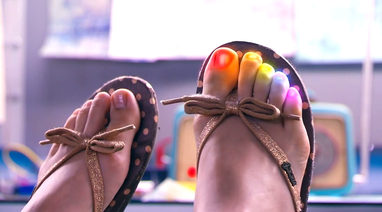
Seeing as the images that spill out of Park Chan-wook's brain suggest a very unique mind, it's fitting that the Korean auteur would set a film in a mental institution. This setting, seen through the eyes of the patients, allows him to enter the world of magical realism and communicate characters' delusions in his typical, over-the-top fashion. The result is that I'm a Cyborg But That's OK is Park's most visually striking film, skimping on his penchant for violence while indulging his knack for world-building and memorable characters.
Beginning in a sea of uniformity, red-scrubbed factory workers are putting together electronics equipment while a cheery supervisor gives instructions and corporate pick-me-up's over the intercom. As Park's camera lands on one particular worker named Young-goon (Im Soo-jung), the instructions shift from their prior exhortations of cleanliness and order, and she is told to cut open her wrist and feed wires inside. Young-goon happily complies, and the next time the viewer see her, she's catatonic in a mental hospital. Believing herself to be a cyborg, she needs to get her power recharged so she can kill the staff and return her grandma's dentures to her at her nursing home. Young-goon's beliefs convince her that she doesn't need food, and she instead nourishes herself by licking batteries. Unmoved by the staff's interventions and therapies, helpful patient Park Il-soon (Rain) takes a break from 'stealing' the other patients' best qualities to convince Young-goon that she needs to eat while not breaking the news to her about her humanity.
As a Korean Cuckoo's Nest, I'm a Cyborg But That's OK shares that film's disdain for the hospital staff. Chaotic group sessions are depicted as a waste of time, devolving into chaos, tears, and shouting. Some of the procedures may be warranted, but since this film is solely focused on the patients, those procedures become cruel instead. Shock therapy, deadening pills, and a painful scene of force-feeding, in which the nutrient paste is traced as it snakes its way around its tubing and into a nose, are all difficult to watch.
Where I'm a Cyborg and Cuckoo's Nest part ways is that the patients here are decidedly ill. Il-soon is a compulsive thief and Young-goon has a serious disorder. Besides the threat to her health that her refusal to eat poses, she also lays out her cyborg philosophy in the film's strangest discursion. In a series of children's book illustrations, the seven deadly cyborg sins are described by pictures of little girls being mean to cartoon cats. The deadliest sin is sympathy, the one thing keeping Young-goon from killing the staff and escaping. If she was able to cleanse herself of that, plus the other deadly sin of hesitation, she would surely kill everyone, though probably not in the cybernetic way she imagines.
Striking that balance between harsh medicine, and watching the charismatic ill go about their jolly business is a difficult needle for I'm a Cyborg to thread. Park comes uncomfortably close to mental illness as an excuse for quirkiness, but the majority of the film allows for a surprisingly tender tone, in which Il-soon has to find a way to help Young-goon in the confines of her delusion. He treats her cyborg problems seriously instead of insisting that she's purely human. Both lead actors sell their dilemma, with Rain wrestling with the best way to talk to Young-goon, and Soo-jung fundamentally unable to keep her human emotions poking through her cyborg worldview. Less expressive actors would've tilted the equation towards patronizing or ridiculous, but as is, their chemistry is apparent.
Given free rein to play in the minds of the mentally ill, Park goes as far as he's ever gone in creating some indelible scenes. Young-goon is the center of several of these, particularly an outdoor, methodical, imaginary shootout captured from above in one shot, but the other patients add to the world as well. An older patient swears by the power of her fuzzy slippers to make the wearer levitate, and sequences revolving around those slippers are like something out of Miyazaki and Studio Ghibli. In fact, this easily could've been one of that studio's animated productions, with all its bright colors and sudden transformations.
I'm a Cyborg But That's OK would be a patronizing, romanticized disaster in lesser hands, but with Park at the tiller, it treads the narrow path between making mental illness seem fun and making it seem intolerable. There's no social justice angle here, in which those that think differently are branded as crazy and locked away, but it does allow that drastically different perceptions of the world might be valuable in their own way. Like his protagonist, Park's whimsical film is wholly unique in its approach, and there's certainly a place for it. B
 RSS Feed
RSS Feed